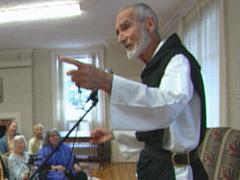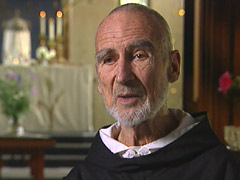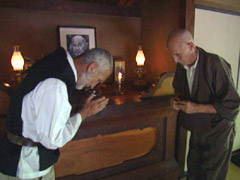In This Episode << SLIDE LEFT TO SEE ADDITIONAL SEGMENTS
Brother David Steindl-Rast on Gratitude
KATE OLSON, correspondent: On a recent Saturday morning at the First Congregational Church in Berkeley, California, church members and neighbors gathered to hear Brother David talk about living “a spirited life.”
Church group singing: Viva, viva la musica…
OLSON: For Brother David, it is grateful living that makes everything come alive.
BROTHER DAVID STEINDL-RAST, OSB: The practice of gratefulness that I’m concerned with is grateful living. That means every moment of your life you practice gratefulness. You practice awareness that everything is gift, everything is gratuitous, and if it’s all given, gratuitously given, then the only appropriate response is gratefulness What we really want is joy. We don’t want things. We don’t want to accumulate things. We forget that, and so gratefulness can help us see that, can help us realize that.
OLSON: Though Brother David acknowledges there are many things for which we cannot be grateful, he encourages people to be open to the opportunity being given in every situation.
 BROTHER DAVID: We cannot be grateful for war. That’s an unmitigated evil. We cannot be grateful for exploitation, for untimely death. But we can be grateful in every situation. The key word is “opportunity.” If you catch onto that, then if we are in practice, when something comes along for which we cannot be grateful, spontaneously we will—our mind will say, “Well, what’s this the opportunity for now?” And there’s always an opportunity for something positive, usually the opportunity to learn something new, even in the worst situations, or for the opportunity to do something. If we learn of an injustice we have the opportunity to stand up and to speak up and to do something.
BROTHER DAVID: We cannot be grateful for war. That’s an unmitigated evil. We cannot be grateful for exploitation, for untimely death. But we can be grateful in every situation. The key word is “opportunity.” If you catch onto that, then if we are in practice, when something comes along for which we cannot be grateful, spontaneously we will—our mind will say, “Well, what’s this the opportunity for now?” And there’s always an opportunity for something positive, usually the opportunity to learn something new, even in the worst situations, or for the opportunity to do something. If we learn of an injustice we have the opportunity to stand up and to speak up and to do something.
OLSON: During the day, people reflected on moments of ‘epiphany’ in their lives – what brother David calls mystic or peak experiences, which often include an experience of profound gratitude.
BROTHER DAVID: The mystic is not a special kind of human being, but every human being is a special kind of mystic. We all have mystic experiences, and in these peak moments, in these peak experiences, all of us have this experience of being one with all. Those are the moments in which we feel most alive, most truly ourselves.
OLSON: Grateful living is something you can practice moment by moment in your daily life, he says, and like other spiritual practices, such as Zen meditation, its goal is to live in the present moment, to see everything as “word of God.”
 BROTHER DAVID: “Word” is not just vocabulary, but “word” is everything that speaks to us, and in this sense a flower can be a word that speaks to me. A poem as a whole can be a word that speaks to me, a piece of art, everything. It speaks to me. It tells me something, it tells me something about ultimate reality. That’s a mystic insight that every human being can appreciate, I think, and experience, if we only allow ourselves.
BROTHER DAVID: “Word” is not just vocabulary, but “word” is everything that speaks to us, and in this sense a flower can be a word that speaks to me. A poem as a whole can be a word that speaks to me, a piece of art, everything. It speaks to me. It tells me something, it tells me something about ultimate reality. That’s a mystic insight that every human being can appreciate, I think, and experience, if we only allow ourselves.
OLSON: Cultivating this aliveness in life is central to Brother David’s vocation as a monk and to his message. Born in Austria, he immigrated to the US in 1952 and joined Mount Savior Monastery in Elmira, New York.
Brother David singing: Alleluia …
OLSON: For decades he has lived part of his life as a hermit, in prayer and contemplation and writing books. The other half he travels the globe lecturing and leading retreats, helping people discover this “aliveness” in their own lives. Finding the deeply shared personal experience is at the heart of Brother David’s work in interreligious dialogue.
Brother David speaking at retreat: “…always checking it back with your own experience, always checking it back against your basic faith…”
 OLSON: A pioneer in the Christian-Buddhist dialogue, he returns frequently to Tassajara, a Zen monastery in California where he lived for several years. As part of the dialogue with Buddhism, Brother David trained in Zen meditation and joined in Buddhist rituals. He says the task of interreligious dialogue today is to understand the meaning beneath the words of particular creeds or beliefs, to discover the faith that underlies these words that we all share.
OLSON: A pioneer in the Christian-Buddhist dialogue, he returns frequently to Tassajara, a Zen monastery in California where he lived for several years. As part of the dialogue with Buddhism, Brother David trained in Zen meditation and joined in Buddhist rituals. He says the task of interreligious dialogue today is to understand the meaning beneath the words of particular creeds or beliefs, to discover the faith that underlies these words that we all share.
BROTHER DAVID: Deep down there is only one faith that all human beings have, and that is that deep trust in life. Even our body expresses that trust in life by always taking another breath. We can’t even stop it. We can’t stop breathing. So that deep trust in life—that is what all humans share, and that expresses itself, then, in a Buddhist way, in a Christian way, and even in ways that we don’t recognize as explicitly religious. Many atheists have a deep faith. They all have that deep faith, but they express it very differently.
OLSON: Beliefs are not faith, he says. Faith is deep trust. And the opposite of faith is not doubt, but fear.
BROTHER DAVID: The one most frequently repeated command in the Bible is not “love your neighbor,” but “fear not.” And if there is one thing that we need in our world, if there’s one thing that we should write on our mirror and see every morning when we look into the mirror, it’s “fear not.” If we went into the day with that command deeply tattooed on our heart, “fear not,” we’d be completely different people and create a completely different world—a world of faith.
OLSON: This deep trust in life is at the heart of what he sees as “the round dance of grateful living.”
BROTHER DAVID: So we participate in this tremendous dance in which the gift comes forth from the source and through thanksgiving returns to the source, where the word comes out of the silence and through understanding returns to the silence. Gratefulness is not just saying “thank you.” It’s acting. It is being your self. A mother is grateful, shows gratefulness by mothering, a scientist by doing science. That is what the Bible calls “in God we live and move and have our being.”
Church group singing: “Viva, viva la musica…”
For Religion & Ethics NewsWeekly, this is Kate Olson reporting from San Francisco.

